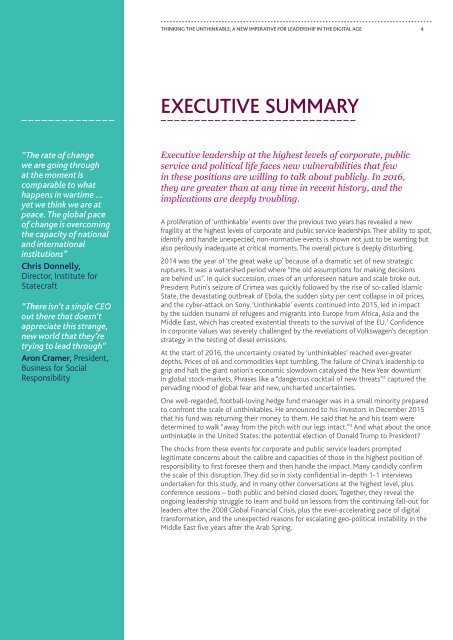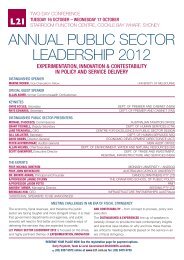Thinking the Unthinkable
Thinking-the-Unthinkable-cima-report
Thinking-the-Unthinkable-cima-report
Create successful ePaper yourself
Turn your PDF publications into a flip-book with our unique Google optimized e-Paper software.
THINKING THE UNTHINKABLE; A NEW IMPERATIVE FOR LEADERSHIP IN THE DIGITAL AGE<br />
4<br />
EXECUTIVE SUMMARY<br />
“The rate of change<br />
we are going through<br />
at <strong>the</strong> moment is<br />
comparable to what<br />
happens in wartime …<br />
yet we think we are at<br />
peace. The global pace<br />
of change is overcoming<br />
<strong>the</strong> capacity of national<br />
and international<br />
institutions”<br />
Chris Donnelly,<br />
Director, Institute for<br />
Statecraft<br />
“There isn’t a single CEO<br />
out <strong>the</strong>re that doesn’t<br />
appreciate this strange,<br />
new world that <strong>the</strong>y’re<br />
trying to lead through”<br />
Aron Cramer, President,<br />
Business for Social<br />
Responsibility<br />
Executive leadership at <strong>the</strong> highest levels of corporate, public<br />
service and political life faces new vulnerabilities that few<br />
in <strong>the</strong>se positions are willing to talk about publicly. In 2016,<br />
<strong>the</strong>y are greater than at any time in recent history, and <strong>the</strong><br />
implications are deeply troubling.<br />
A proliferation of ‘unthinkable’ events over <strong>the</strong> previous two years has revealed a new<br />
fragility at <strong>the</strong> highest levels of corporate and public service leaderships. Their ability to spot,<br />
identify and handle unexpected, non-normative events is shown not just to be wanting but<br />
also perilously inadequate at critical moments. The overall picture is deeply disturbing.<br />
2014 was <strong>the</strong> year of ‘<strong>the</strong> great wake up’ because of a dramatic set of new strategic<br />
ruptures. It was a watershed period where “<strong>the</strong> old assumptions for making decisions<br />
are behind us”. In quick succession, crises of an unforeseen nature and scale broke out.<br />
President Putin’s seizure of Crimea was quickly followed by <strong>the</strong> rise of so-called Islamic<br />
State, <strong>the</strong> devastating outbreak of Ebola, <strong>the</strong> sudden sixty per cent collapse in oil prices,<br />
and <strong>the</strong> cyber-attack on Sony. ‘<strong>Unthinkable</strong>’ events continued into 2015, led in impact<br />
by <strong>the</strong> sudden tsunami of refugees and migrants into Europe from Africa, Asia and <strong>the</strong><br />
Middle East, which has created existential threats to <strong>the</strong> survival of <strong>the</strong> EU. 1 Confidence<br />
in corporate values was severely challenged by <strong>the</strong> revelations of Volkswagen’s deception<br />
strategy in <strong>the</strong> testing of diesel emissions.<br />
At <strong>the</strong> start of 2016, <strong>the</strong> uncertainty created by ‘unthinkables’ reached ever-greater<br />
depths. Prices of oil and commodities kept tumbling. The failure of China’s leadership to<br />
grip and halt <strong>the</strong> giant nation’s economic slowdown catalysed <strong>the</strong> New Year downturn<br />
in global stock-markets. Phrases like a “dangerous cocktail of new threats” 2 captured <strong>the</strong><br />
pervading mood of global fear and new, uncharted uncertainties.<br />
One well-regarded, football-loving hedge fund manager was in a small minority prepared<br />
to confront <strong>the</strong> scale of unthinkables. He announced to his investors in December 2015<br />
that his fund was returning <strong>the</strong>ir money to <strong>the</strong>m. He said that he and his team were<br />
determined to walk “away from <strong>the</strong> pitch with our legs intact.” 3 And what about <strong>the</strong> once<br />
unthinkable in <strong>the</strong> United States: <strong>the</strong> potential election of Donald Trump to President?<br />
The shocks from <strong>the</strong>se events for corporate and public service leaders prompted<br />
legitimate concerns about <strong>the</strong> calibre and capacities of those in <strong>the</strong> highest position of<br />
responsibility to first foresee <strong>the</strong>m and <strong>the</strong>n handle <strong>the</strong> impact. Many candidly confirm<br />
<strong>the</strong> scale of this disruption. They did so in sixty confidential in-depth 1-1 interviews<br />
undertaken for this study, and in many o<strong>the</strong>r conversations at <strong>the</strong> highest level, plus<br />
conference sessions – both public and behind closed doors. Toge<strong>the</strong>r, <strong>the</strong>y reveal <strong>the</strong><br />
ongoing leadership struggle to learn and build on lessons from <strong>the</strong> continuing fall-out for<br />
leaders after <strong>the</strong> 2008 Global Financial Crisis, plus <strong>the</strong> ever-accelerating pace of digital<br />
transformation, and <strong>the</strong> unexpected reasons for escalating geo-political instability in <strong>the</strong><br />
Middle East five years after <strong>the</strong> Arab Spring.



